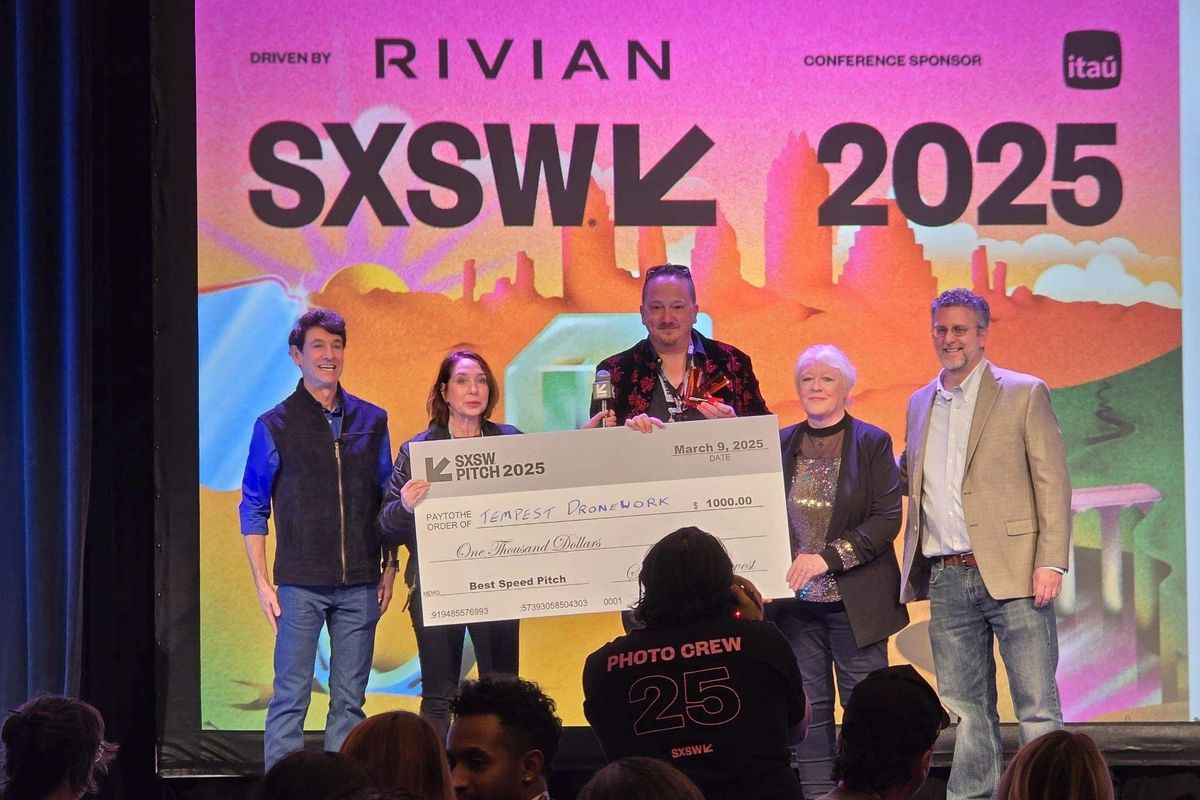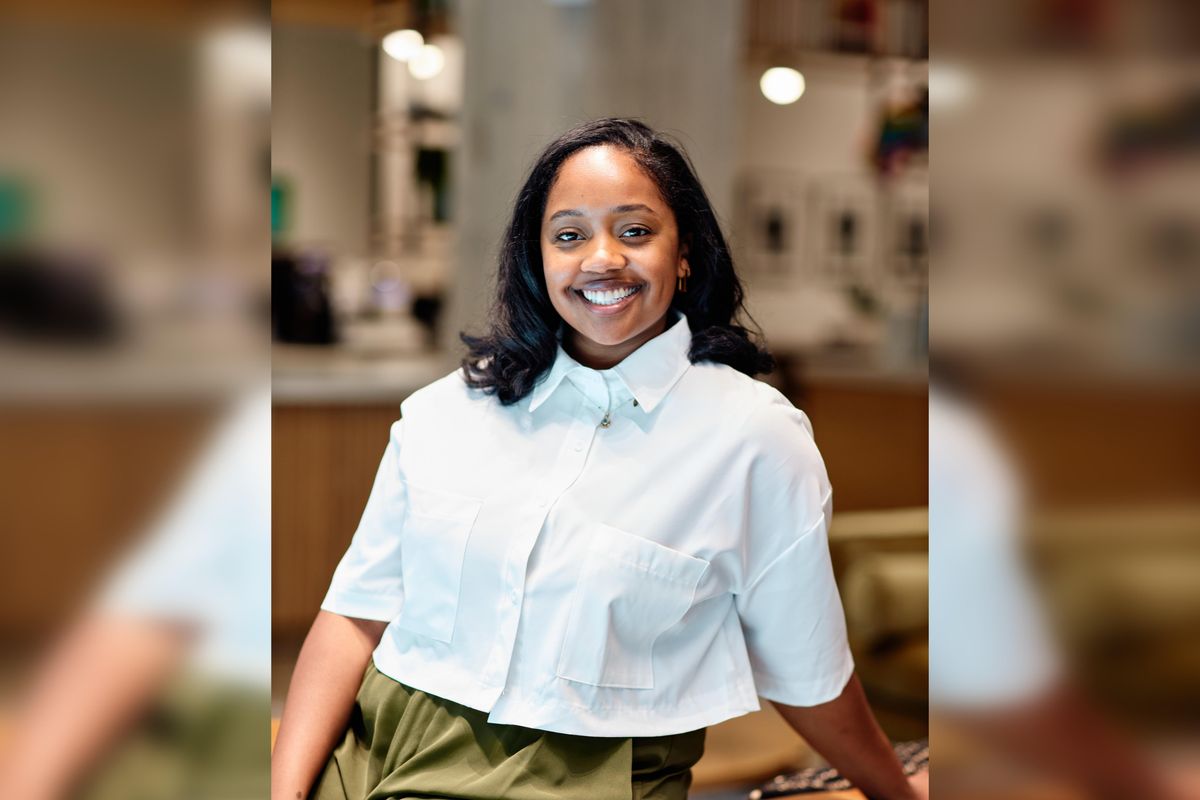It’s not easy to be a standout at South by Southwest, especially during SXSW Interactive, which is the subsection of the festival that focuses on new media, technology and entrepreneurship.
But it’s even more difficult to win at SXSW Pitch, the competition for startups and entrepreneurs that showcases innovative new technology to a panel of industry experts, high-profile media professionals, venture capital investor, and angel investors.
Tempest Droneworx, a Houston-based company that provides real-time intelligence collected through drones, robots and sensors, did just that in March, taking home the Best Speed Pitch award. It was also named a finalist and alternate in the full SXSW Pitch competition. The company is known for it flagship product, Harbinger, a software solution that agnostically gathers data at virtually any scale and presents that data in easy-to-understand visualizations using a video game engine.
Tempest CEO and founder Ty Audronis says his company won based on its merits and the impact it’s making and will make on the world. Audronis founded the company after his hometown of Paradise, California, was destroyed by a wildfire in 2018.
“(SXSW) was a huge moment for our team,” says Audronis, whose background is in science visualization, data visualization and visual effects for the movie industry. “This is about what everyone at Tempest Droneworx has created, and our mission to make sure that issues—like the one that befell Paradise, California, my hometown, and the inspiration for our Harbinger software—don’t become the full-blown (disasters)."
Audronis shares that the company is working to release an agriculture beta this summer and is raising a Tactical Funding Increase (TACFI) round through the AFWERX, the Department of the Air Force’s innovation arm.
Tempest’s Harbinger is impressing investors and clients alike, but what is it exactly and what does it do?
The best way to explain the solution is in how it’s redefining the agriculture space. Tempest has deployed the product at Grand Farm in North Dakota, an agtech operation that seeks to promote sustainable, climate-resilient farming using applied technology.
“We decided to go down the road of agriculture,” Audronis says. “We're currently installed at the Grand Farm in North Dakota, which is a farm that is very closely tied to Microsoft. They do third-party verification of new soils and fertilizers, and we are helping them with visualizing the data that they're getting from their sensors.”
Additionally, Audronis and his co-founder and wife, Dana Abramovitz, spearhead a pilot program at Doubting Thomas Farms, an organic farm in Minnesota, where the company has installed 22 in-ground sensors that can measure volatile organic emissions.
To further optimize their solutions approach, Tempest Droneworx will also train artificial intelligence to look for overspray from neighboring non-organic farms. This will help maintain organic certification and reduce insurance claims for lost crops.
“This will save Doubting Thomas Farms and other organic farms a boatload of cash,” Audronis says.
During an exclusive tour with InnovationMap, Audronis pulled up a live feed of sensors buried around the Minnesota farm up on the conference room display. The feed did, in fact, look like a video game, with the sensors giving real-time data about the farm’s temperature, moisture level, humidity, CO2 and nitrogen.
Harbinger will collect, extract and extrapolate all of the data and later provide a digital almanac for farmers to track the history of their crops.
As the office tour continued, Audronis pointed out the company’s expanding partnership with the U.S. Military.
As a retired U.S. Navy veteran with over two decades of experience designing, building and piloting drones, Audronis understands that Harbinger has multiple military applications that will ultimately save lives—a core tenet of his company’s mission.
The company has launched a robotic dog known as UBU, developed by Tempest partner Ghost Robotics, that enables faster, more accurate ground surveys for explosive devices. This task previously required multiple airmen and hours to complete, Audronis says.
With agriculture and military initiatives in progress and making an impact, Audronis hopes to one day bring his original vision for Tempest Droneworx and Harbinger full circle by getting the call to combat California’s next catastrophic wildfire.
“We're proving our technology in military and in agriculture right now,” Audronis says. “Eventually, I would like to still save some lives with wildfire. That's really the purpose of the company … Whether it's agriculture, smart cities, the bottom line is saving lives through real-time situational awareness."

 Ty Audronis, CEO and founder of Tempest Droneworx
Ty Audronis, CEO and founder of Tempest Droneworx Nicolaus Radford, founder and CEO of Nauticus RoboticsNicolaus Radford. Image via LinkedIn
Nicolaus Radford, founder and CEO of Nauticus RoboticsNicolaus Radford. Image via LinkedIn



 Dana Abramowitz and Ty Audronis co-founded Tempest Droneworks. Photo courtesy of Tempest Droneworx
Dana Abramowitz and Ty Audronis co-founded Tempest Droneworks. Photo courtesy of Tempest Droneworx
 Apple doubles down on Houston with new production facility, training centerPhoto courtesy Apple.
Apple doubles down on Houston with new production facility, training centerPhoto courtesy Apple.





